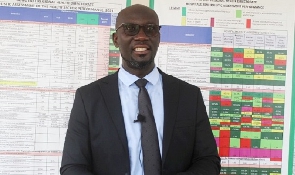Correspondence from Bono East Region
It has emerged that a critical barrier to attracting and retaining doctors to the Bono East Region is inadequate accommodation.
This significant healthcare challenge has become an obstacle to quality and effective healthcare delivery and impeded the region’s target of attaining a doctor-to-population ratio of 1:7500.
Speaking at the 2023 mid-year Regional Performance Review in Kintampo, the Bono East Health Director, Dr. Fred Adomako-Boateng, bemoaned that despite 16 doctors voluntarily deciding and accepting to work in the region, it failed to materialise due to the unavailability of accommodation.
“For the first time in the history of Bono East, we had a record of 16 doctors voluntarily deciding and accepting to come and work in this lovely region of ours, but when push comes to shove, only 8 or 9 could finally work here…The challenge, fellow Ghanaians was accommodation”, the Bono East Health Director said.
He appealed to stakeholders to support in that regard so that health personnel can deliver on their core mandate.
“I will like to appeal to the community of the assemblies, traditional authority, citizens of this region, and philanthropists to support in this regard for we(sic) as a service to deliver on our core mandate of providing quality service”, he added.
On his part, the Bono East Regional Minister, Kwasi Adu-Gyan commended health personnel in the region for their selfless and dedicated service but tasked them to improve on the upsurge in malaria infections and other areas that are core to essential service delivery.
He said: “For example, malaria incidence worsened from 109/1000 population in 2021 to 119/1000 population in 2022 and 121/1000 in 2023, and measles-rubella 2 coverage stagnated with 89.8% in 2021 and 88.6% in 2022 and worsen to 67.3% in 2023. These are areas that are core to essential service delivery. I would admonish the Regional Health Directorate and other stakeholders to work together to improve”.
Regional News of Sunday, 20 August 2023
Source: www.ghanaweb.com













